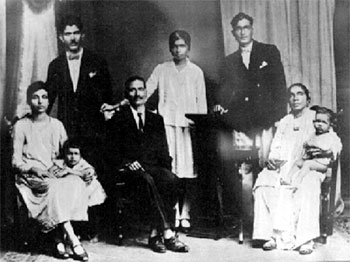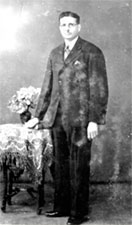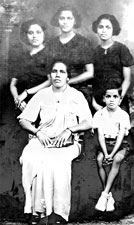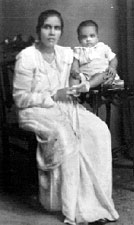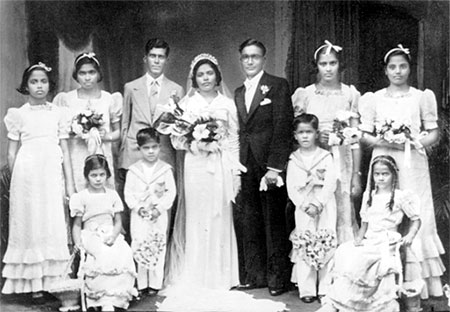
| Dedication |
|
|
| Preface |
|
|
| Contents |
|
|
| Personal
Tributes to Pascoal |
|
|
| Family Trees |
|
|
| About the Author |
|
|
| Home |
|
Pascoal returned to Kenya, back to Isiolo. He carried on his duties faithfully and then, three years later, in 1936 he was promoted to Clerk Grade I. In that capacity his work took him to the Nyanza and Rift Valley and Coast Provinces. He served as Court Clerk, District Clerk and Cashier for yet another three years. And then it was time to go home again - this time with a definite purpose! Finding a match Pascoal was now well established in his post. He was 31 years old. He believed the time was now ripe to comply with his mother's ardent wish that he secure a suitable partner in life. Besides, he himself now wanted a companion. His younger sister Luizinha was already happily settled, to be married shortly to a young man Antonio Francisco D'Souza. Besides, marriage proposals for Pascoal were piling up. Pascoal finally made his choice. Esmeralda Tolentina D'Sousa was born in 1919 in Nairobi where her father Miguel Andre Feliciano D'Sousa was employed. He hailed from Gumalvaddo, Anjuna. Apparently the girl returned home to her native Goa while quite young, probably with her mother Ditoza Augustina, nee Noronha. She too had attended the Portuguese primary school at Tembi. After completing "Primeira Grav" in Anjuna she took the "Segunda Grav" exam from Escola Nacional at Panjim. She then took up English, completed Std.V in "Rogdo's school", moving to Std.VI at the Holy Cross Convent School at Siolim. At this stage it was arranged that she marry Pascoal. Arranged marriages were then the order of the day. Of course, the two young people usually had some say in the matter. This match was to the mutual satisfaction of both parties and to their families as well. Esmeralda was a charming, cultured young lady, and also to her credit was her previous association with Africa which would make it easier for her to adjust to that environment.
| |||||||||||||||||||||
|
In anticipation It was customary for parents of the bride to shower gifts on their daughter.It was expected that she would bring some dowry by way of cash, and jewels for her own adornment. This traditional issue is usually settled in advance. Further, to ensure her every comfort in her new home her parents sent over their daughter's trousseau, her embroidery, house linen, some traditional copper vessels for cooking, and even a few items of personal furniture like the bed, wardrobe and dressing-table just prior to the wedding day. These items would be loaded onto a cart to reach the bridegroom's house well before the bride did. Fire crackers again would announce to the neighbourhood the arrival of the goods. Quite often they were laid out proudly on display in an inner room for admiration of the wedding guests. There were the usual happy preparations for a wedding in Goa. Relatives came in droves, even from afar. On the evening prior to the ceremony, in the bride's home it is customary for women of the family to congregate for the traditional "ros" - the bride is to be given a bath in coconut milk! She is seated with a little sister or cousin and, one by one, the ladies come forward to pour the cup over her head. They bless her, joke with her, give her advice, and to the accompaniment of a Konkani "mando"/ Goan folk-songs are chanted in chorus. Verses are often humourously improvised on the spot to tease the blushing bride. On this occasion she is usually decked with fresh floral wreaths and garlands; not forgetting the shimmering coloured glass bangles which will be her distinct symbol of the married state. At the bridegroom's place too there is much merry-making, music and drinking. The de Mello house had been enlarged with the addition of a few more rooms. It was also renovated. Today wedding receptions are invariably celebrated in halls where every detail is attended to professionally. But in Pascoal's day, long before there was any community hall in the village, it was customary to erect a colourful "mato" or canopy in a clearing next to the house. The ground beneath was liberally coated with a sprinkling of "shen" or cow dung, to smoothen it for dancing. Erecting the pendal (canopy) was great fun, as there were many willing hands. Now there was shade and added space for the guests who would throng the home for the festivities. On the morning of the great day the spacious canopy was decorated with fresh leaves and flowers. Wedding Bells Fire crackers are an integral part of any Goan celebration. Specially loud outbursts signalled the departure of the bridegroom to church and also announced his arrival there. The marital knot that bound Pascoal and Esmeralda was blessed by young Fr. Accasio Dourado, Curate of the church. As his personal gift to the bridal couple he also celebrated the nuptial mass. After the exchange of marriage vows, and signing the church register , another volley of crackers marked the dramatic close of the church ceremony. The couple walked together down the aisle, hand in hand, followed by their entourage. They made a handsome pair: Pascoal beaming and elegant in his smart new suit, Esmeralda, demure and lovely in her flowing white gown and bridal veil wreathed with flowers. In addition to having beside them their loving parents to share their joy, both had their families, numerous relatives and close friends. All came forward to offer their congratulations. The Best Man was Alex D'Souza of Mazalvaddo. One pageboy and flower-girl - Alu Mendonca and his sister Annie - were Pascoal's nephew and neice, his elder sister Severina's children. Little Lionel de Mello, the other pageboy, was the son of his cousin. Esmeralda had three charming sisters younger than her: Benetina, Rosa and Carmelina. They, along with Pascoal's younger sister Luizinha, were the bride's-maids. A pretty picture indeed! It was a bright sunny morning. The party moved on, some driving in batches to de Mello vaddo. There was an air of festivity pervading the scene, and the dresses of the ladies heightened the riot of colour. The best dance band in all Bardez "Blu Lyrics" was in attendance. The retinue of guests mingled together, exchanging pleasantries while waiting expectantly for the bridal couple who were last to enter. Suddenly, a string of fire-crackers exploded and the band played the Wedding March, for Pascoal and Esmeralda had arrived!
Group Wedding Photo Reception At the door Pascoal's parents lovingly greeted their new daughter-in-law with warm embraces and gently led the two, over the thresh-hold of their home, right up to the family altar. Candles were lit, incense was burnt, and the "Te Deum" was sung, praising and thanking the Lord. The young couple received a special blessing; after that Christalina placed a solid gold chain round the neck of Esmeralda and showered her with personal gifts. These significant traditional touches concluded, once again the band took up its refrain. After everyone was seated, a toast to the bridal couple was proposed. L.J. Denis of Prias de S. Antonio had been requested to do the honours as toast-master of the day. This respected personality had recently returned home to Anjuna to enjoy his retirement after several years of distinguished service with the British Administration in Kenya. He was well acquainted with the de Mello family. Raising his glass of sparkling champagne to propose a toast to the newly-weds, he remarked on the linkage of two old families of Anjuna. Then , complimenting the bride on her charm, her talents and her accomplishments, he went on to extoll the qualities of head and heart with which the bridegroom was endowed. Very correctly he predicted that the bright young man would go a long way in the service and carve a niche for himself in life. Pascoal promptly replied to the toast. His was no tongue-tied incoherent babbling, normally expected of a nervous groom. Everyone was amazed at his brilliant oratory and his confident delivery, in the presence of such a large gathering. It was Pascoal's debut into public speaking, and he really cut a fine figure with that maiden speech. Part of the revelry was the wedding march, the newly-weds leading, a string of joyous couples in train - prancing right through the house and out of it, causing such a flutter to the chickens in the yard, and a scramble to the dogs and the piglets, before returning merrily in a circle on to the dance-floor. After the cutting of the wedding cake there followed a lavish service of the choicest Goan cuisine and liquor. In a lull between the dancing and the feasting, by popular request the bride sang a lilting "mando" specially composed for her on that auspicious day by the Best Man. Dancing and merriment continued late into the evening. Even after the guests departed, the house was full of relatives who had come from a distance and could not miss the celebration next day. "Tornaboda" In Goa it is customary for the parents of the bride to invite their new-found son-in-law to come over to their place on the day following the wedding. He has to be accompanied not just by his bride, but also by his own parents, his immediate family,choice relatives and friends. It is a jolly party that leaves, again with crackers broadcasting the move. At the bride's house they are greeted by her family and friends. And once again the band plays and there is dancing, feasting and merriment till the guests depart. The young couple stays on with a small escort of their choice. All are well looked after, and when it is time to return a group from the bride's house accompanies them, loaded with the traditional "vogins" - sometimes a cart full of home-made sweets: the usual platters of "dos"or gram sweet, hundreds of small flat mounds of "bol", jaggery-coconut cakes, and big bunches of the famous yellow Moira bananas. They are greeted with crackers. After the mother-in-law accepts a generous helping of the sweet gifts, the rest is ceremoniously distributed to the neighbours by a group of young girls from both families of the newly-weds, going from house to house. The bridal couple are usually invited here and there, to the homes of friends and relatives for elaborate meals in their honour. But all good things come to an end..... and after a while they settle to savour the joys of their new life together. So it was with Pascoal and Esmeralda.
| |||||||||||||||||||||
| |||||||||||||||||||||
